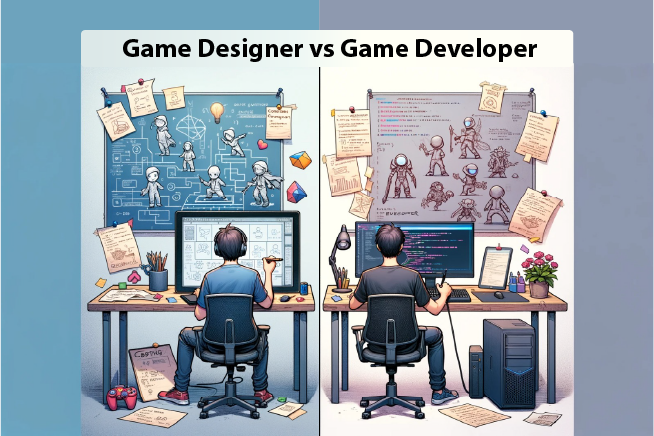Table of Contents
ToggleIntroduction
Tetris, Candy Crush Saga, Minecraft, GTA. You must have come across these names at least once. Whether playing them as a hobby or understanding their design and logic, games must have intrigued you at some point in life. If you are someone who takes an interest in understanding how games are designed and built, you might have considered Game Development as a career option. In this blog, we will look at two profiles: Game Designing and Game Development. Let’s understand the difference between a Game Designer and a Game Developer in detail.
Game Development Industry: An Overview
The video game industry forms a part of the bigger entertainment industry, which consists of film, music, and sports industries, among other sectors. Gaming has been a mainstream hobby for a long time, and in the past few years gained momentum as a sector with major revenue earning potential. Statista reports the Video Games market is expected to have 1,472 million users by 2027. It also claims that the market is expected to grow at an annual rate of 8.76% between 2024 and 2027. It would be fair to conclude based on these projections that the Game Development industry will see a robust demand for game developers and designers proficient in creating games for both traditional and modern setups. Let’s look at the stages that a game idea goes through to understand where game designers and developers step in.
Key Stages of Game Development
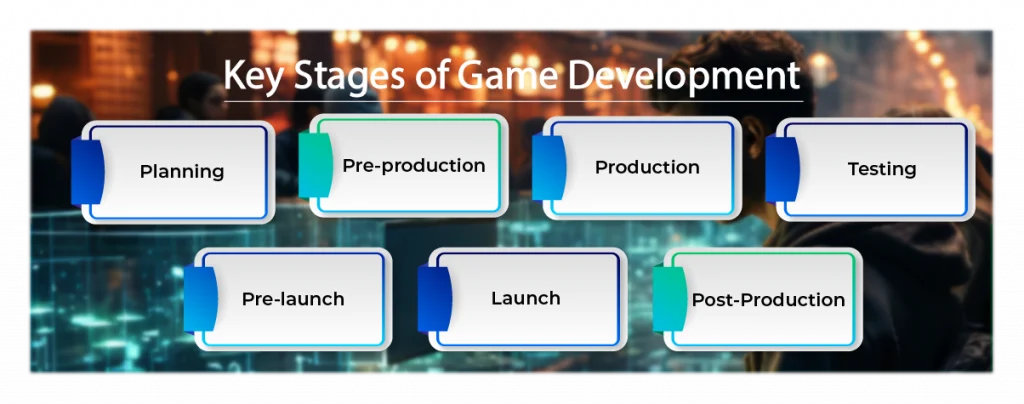
Planning
This is the stage where the development team decides on the basics. The game designers and developers define the game concept, goals, and scope by conducting market research and identifying the target audience. Then, the team creates a project timeline, sets milestones, and fixes the budget. Finally, the development team forms a game development team and assigns the roles to the members.
Pre-production
This is the stage where detailed conceptualization and design documentation of the game takes place. Game designers complete the storyboarding and initial prototyping, finish the asset planning and create a game design document. Game developers perform a technical feasibility analysis and accordingly plans for technology, tools, and middleware.
Production
This stage brings together game developers, game designers, artists, illustrators and other skilled professionals to implement game mechanics and features. Game assets, including graphics, audio, and animations are developed through iterative development and regular team collaboration. Then, all the components are integrated into a cohesive game. This is followed by continuous playtesting and refinement.
Testing
This is an important stage that decides the fate of the game. Game developers and designers lead playtesting sessions where the game goes through quality assurance and bug testing stages and user testing for feedback and improvements. Based on the feedback, there are rounds of performance optimization and debugging. The iterative testing cycles ensure a polished product. This stage mainly helps in balancing gameplay elements and adjusting difficulty levels.
Pre-launch
The pre-launch stage helps in making strategic decisions about releasing the game in the market. Various marketing strategies and promotional materials for the game are finalized. Game designers are involved in creating promotional material like teasers and previews to build anticipation for the game. This stage also involves conducting closed beta tests for a select audience. Additionally, game developers also address last-minute issues and fine-tunes the game accordingly so that it is ready for distribution platforms and storefronts.
Launch
The launch stage is where the game is released and distributed globally. Game developers and designers monitor initial player feedback and reviews and address any immediate post-launch issues. It also tracks game performance and server stability. The launch stage of the game also has many launch events, promotions, and community engagement.
Post-Production
This is the stage where the game developers and designers monitor player feedback and reviews contiguously. Based on the feedback, the game development team might need to roll out patches and updates to address issues. Additionally, the game development team might implement additional features and content based on user feedback. The post-production stage is also a phase where forums and social media are exploited for community support and engagement. Finally, future expansions, updates, or sequels are planned for the game based on its success.
Who is a Game Designer?
A game designer is someone who decides what a game will look like. A game designer creates a draft of the game that focuses on details about the target audience, storyline, characters, maps, plots, rules and levels, play methods, and user interface creation. It is the game designer’s responsibility to come up with original ideas and innovative gameplay to make the game enjoyable and appealing.
Responsibilities of a Game Designer
A game designer is someone who decides what a game will look like. A game designer creates a draft of the game that focuses on details about the target audience, storyline, characters, maps, plots, rules and levels, play methods, and user interface creation. It is the game designer’s responsibility to come up with original ideas and innovative gameplay to make the game enjoyable and appealing.
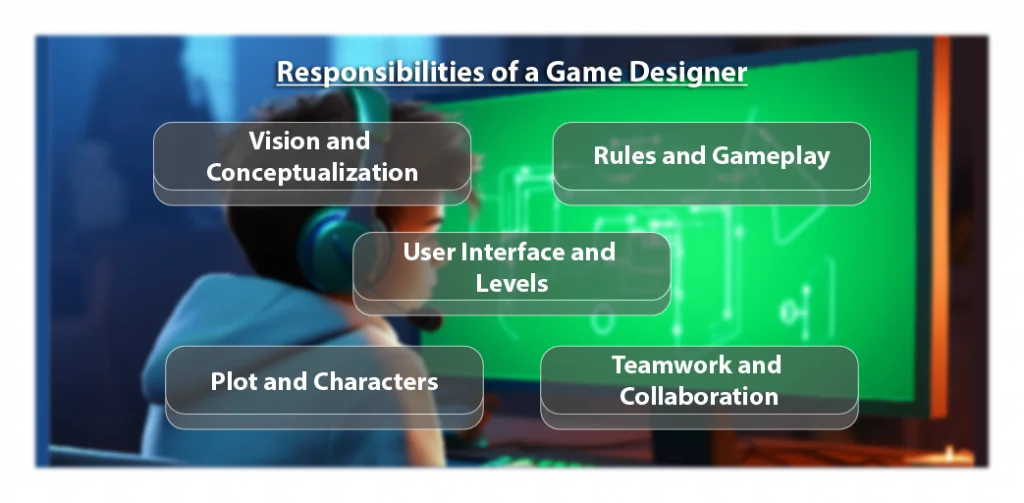
Vision and Conceptualization
A game designer establishes the creative direction for a game by conceptualizing engaging game ideas. Game designers also make sure that the game idea aligns with market trends and the expectations of the players who will enjoy the game. This involves defining the core themes of the game, the overall tone it will have, and its general artistic direction.
Plot and Characters
It is the game designer’s job to make the game immersive for players. This happens when designers develop engrossing narratives and storylines, adding plot twists, and interesting character arcs. The characters should be memorable; for example, Jeol Miller and Ellie Williams from The Last of Us franchise are characters with unique personalities, backstories, and motivations. The game follows consistent storytelling and character development throughout the game.
Rules and Gameplay
The storyline and characters of a game come to life when game designers define the game mechanics, rules, and core gameplay elements. Game designers also work to balance the gameplay such that players have an enjoyable and challenging experience while playing the game. Game designers also revisit the gameplay mechanics based on playtesting and user feedback.
User Interface and Levels
A game becomes an immersive experience for players when game designers build intuitive and visually appealing user interfaces for a seamless player experience. Game designers also work on level layouts, puzzles, and challenges that align with the overall game design. In addition, they also team up with artists and developers to integrate UI elements and level designs into the game.
Teamwork and Collaboration
One of the most important responsibilities of a game designer is teamwork. A game crosses all the stages successfully only when game designers, developers, artists, sound designers, and other team members work collaboratively. It is important for everyone in the Game Development team to communicate each other’s creative vision and design goals, exchange feedback and revisit designs based on input from various disciplines.
Who is a Game Developer?
A game developer works on the technical aspects of the game. Game developers turn a game designer’s vision into reality. They use the draft created by game designers to write code and create programs for the game. Game developers also work on adding sound effects and artistic elements. They also run various tests to identify limitations in the game and fix bugs and technical issues within the game. While fitting the game designer’s idea into code, a game developer’s responsibility is to make the game playable. This includes movements, object interaction, and other game mechanics.
Must read: HOW TO BECOME A GAME DEVELOPER?
Responsibilities of a Game Developer
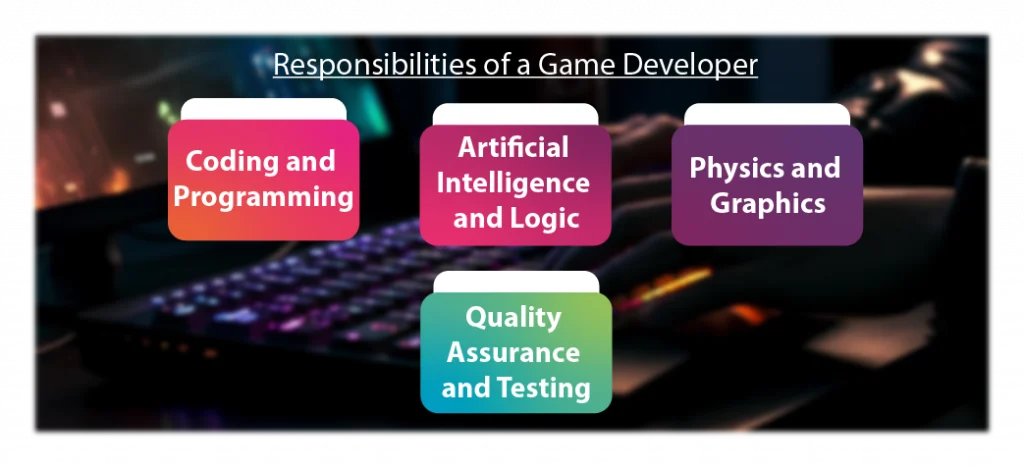
Coding and Programming
A game developer primarily develops and implements efficient and usable code for all the game components. Game developers collaborate with other developers and designers so that the gameplay features are integrated seamlessly. They also ensure smooth and responsive gameplay but debugging and optimizing the game code. Game developers can achieve this by staying updated on programming languages, tools, and best practices.
Artificial Intelligence and Logic
Game developers are also entrusted with creating challenging and realistic non-player characters (NPCs). Developers design and implement AI systems to achieve this goal. They also develop systems that decide the logic for the decision-making, pathfinding, and adaptive behaviors. They also revisit the AI algorithms when there is a need to enhance the overall gaming experience. Game developers might collaborate with game designers to align AI behavior with the intended game design.
Physics and Graphics
A good, immersive, enjoyable game is one that shows realistic movements and interactions. Game Developers implement physics engines to simulate these within the game. They develop and optimize graphical rendering systems to create visually appealing graphics. Game developers also team up with artists and designers to integrate 3D models, textures, and animations. Additionally, they are also responsible for ensuring smooth frame rates and visual fidelity across different hardware configurations.
Quality Assurance and Testing
Game developers collaborate with QA teams to create test cases and scenarios for different game elements. They are required to test game features to identify and document bugs and issues. Generally, this is done by implementing and maintaining automated testing processes to streamline quality assurance. By conducting regular QA and testing, game developers optimize game performance and address any technical issues before release.
Game Designers vs Game Developers: Education and Courses
Game Designers can pursue an associate degree or a bachelor’s degree in game design in video game design to become a video game designer. If you want to know how to become a game designer, here are a few educational paths to follow to learn game designing:
- Bachelor’s/master’s in game design
- Online certifications for game design specializations
- User Experience (UX) Design Courses
- Graphics and Animation Courses
- Storytelling and Narrative Design Courses
Game Developers generally hold a bachelor’s degree in game development and simulation programming, or in other disciplines like computer science or software engineering. Game Developers can also pursue an associate degree in game development. If you are wondering how to become a game developer, here are a few academic paths to follow:
- Bachelor’s/master’s in game development
- Bachelor’s/master’s in computer science or software engineering
- Online programming courses
- Game development boot camps
- Game development specializations To
| Game Designing | Game Development |
|---|---|
| Simulation and Serious Games | Simulation and Serious Games |
| Advanced Animation | Advanced Algorithms and API |
| 3D Scripting & Advanced Rigging | Web API for Games |
| Advanced 3D Modeling | 2D and 3D Game Console Programming |
| 3D Digital Sculpting | Mathematics for Game Development |
| Game Engines | Advanced Game Design |
| Advanced Texturing | Design Patterns |
| Virtual Production/Motion Capture | Software Testing and Quality Assurance |
| Advanced Game Design | 2D Game Engine and Tool Development |
| VR Development | Virtual Reality Development |
| Game Analytics and Statistics | Artificial Intelligence |

Don't miss out on your chance to work with the best
apply for top global job opportunities today!
Game Designers vs Game Developers: Skills Required
Game Designer
A game designer should have an undying passion for gaming. They should know how to innovate, as no two games are the same. It is important that game designers are adept at coming up with creative and innovative solutions. Strong knowledge of 3D modeling and excellent visual and drawing skills are essential. In addition, game designers should also demonstrate great problem-solving abilities and exceptional analytical skills. Further, it is important to have strong communication and presentation skills as game designers work and coordinate across teams.
Game Developer
A game developer should be an expert in coding and programming. Developers should have experience of using programming languages to develop games. For instance, a strong command over C++ along with advanced algebra skills will give developers an upper hand as potential candidates as game developers. In addition to the essentials, it is also important that game developers are patient throughout the stages of bringing a game to life and releasing it.
Game Designers vs Game Developers: Possible Career Paths
Game Designing Jobs
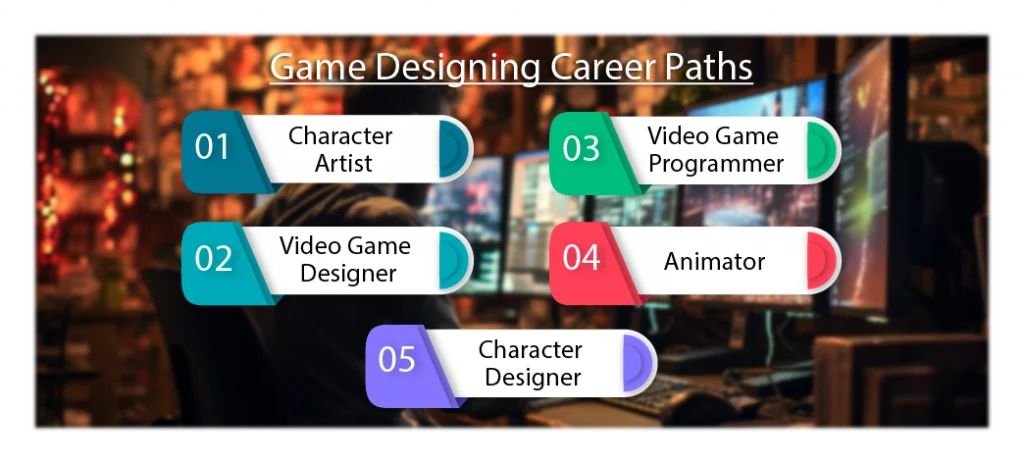
Character Artist: Character artists, art directors, or designers specializing in character animation create the visual designs for characters, including concept art, 3D models, and textures.
Video Game Designer: They focus on the overall game design, including mechanics, level layouts, and user experience as lead game designers, creative directors, or a professional with a specialization in narrative or systems design.
Video Game Programmer: A video game programmer works with a game designer to code and implement the game features. They also work on the systems and mechanics based on the designer’s vision.
Character Designer: They are professionals who create the visual appearance, personality, and style of characters in a game.
Animator: They bring characters, environments, and plot to life through motion. Animators usually opt for profiles like lead animator, animation director, and motion capture technology experts.
Game Developer Jobs
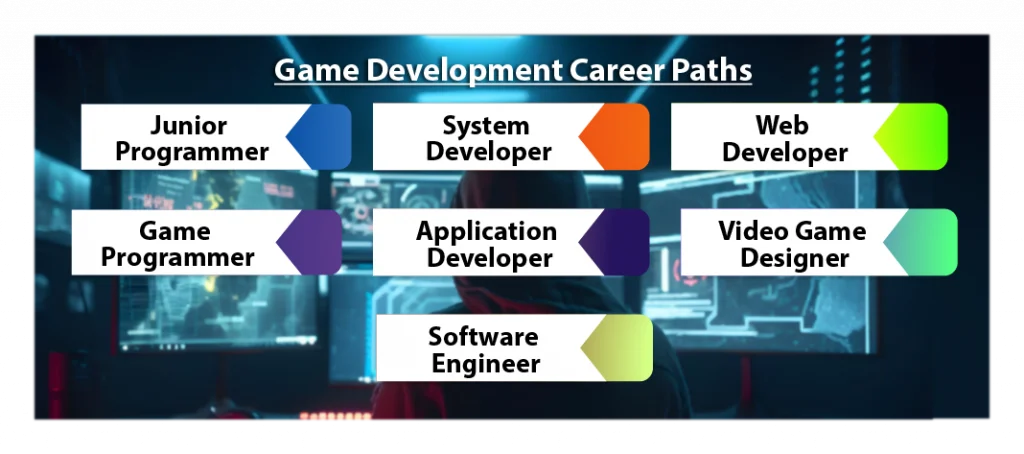
Junior Programmer: Junior programmers are entry-level professionals who collaborate with senior developers on various aspects of game development. As they move up, they can specialize in specific areas of game development and also move to roles such as game programmer or system developer.
Game Programmer: Game programmers specialize in graphics programming or artificial intelligence. They code and implement the game features, mechanics, and systems.
System Developer: A systems developer is responsible for designing and developing game systems that ensure efficient functionality.
Application Developer: Apps developers are proficient in architecture or system engineering, and they also specialize in complex system designs. They develop game-related software, tools, and other applications.
Web Developer: A web developer is a professional who works to design and implement online features, interactive websites, and other web-based components for games.
Software Engineer: Lead software engineers and software architects work on the software development for games across various applications.
Video Game Designer: These are professionals who work on overall game design, including mechanics, levels, and user experience.
Quality Assurance Engineer: These are game developers who conduct tests to identify and address bugs and other issues to ensure the quality of game software.
Game Designers vs Game Developers: Tools
Game Designers should know how to use Game Design Document (GDD) software and tools like Google Docs and Microsoft Word. Additionally, they should also have experience using specialized software for creating and sharing comprehensive game design documents. Good game designers are comfortable using prototyping tools and software such as Unity and Unreal Engine to build playable prototypes of game concepts. In addition, they also know their way around flowcharts and diagram software for creating flowcharts and diagrams to visualize game mechanics and structures. Game designers are also adept at using physical whiteboards, sketching tools, or digital alternatives like tablets and styluses for brainstorming and illustrating ideas.
Game Developers need to have experience with coding and debugging. They should be proficient in using IDEs and software like Visual Studio, and Eclipse for coding and debugging. Further, game developers should know how to use Unity, Unreal Engine, or custom engines for implementing game mechanics, graphics, and physics. Next, it is crucial to have the knowledge of using tools like Git or SVN for collaborative code management. Game developers also have experience using graphics and animation software like Adobe Creative Suite, Blender, or Maya for creating visual assets. Finally, game developers should also know how to implement bug tracking and project management tools (Jira, Trello, or Asana) for tracking bugs, tasks, and project progress.
Game Designers vs Game Developers: Salaries
| Game Developer Salary in India | Game Designer Salary in India |
|---|---|
| Average Base Pay: ₹4L – ₹10L/yr | Average Base Pay: ₹4L – ₹12L/yr |
| Additional Cash Compensation | Additional Cash Compensation |
| Average: ₹18,72,459 | Average: ₹21,69,742 |
| Range: ₹ 17,80,684 – ₹ 19,64,233 | Range: ₹20,76,754 – ₹22,62,730 |
| Game Developer Salary in USA | Game Designer Salary in USA |
|---|---|
| Average Base Pay: $72K – $1L/yr | Average Base Pay: $73K – $1L/y |
| Additional Cash Compensation | Additional Cash Compensation |
| Average: $10,971 | Average: $16,790 |
| Range: $8,228 – $ 15,359 | Range: $12,593 – $ 23,506 |
Source: Glassdoor
Game Designer vs. Game Developer: Which career path should I choose?
The outlook for the gaming industry currently is quite exciting, as the number of users in the video games market is expected to reach 1,472.0 million users by 2027. Both game designers and game developers play a crucial role in game development. While a game designer focuses on the conceptual aspects, a game developer transforms those concepts into usable code. A good command of design and development skills is essential for aspiring game developers and designers. As modern gaming trends are paving the way for an improved, immersive gaming experience compared to traditional gaming, it is important to understand where your interests lie as an aspiring game developer or designer. One of the important factors that can help you determine your career path is the compensation game developers and designers draw. As mentioned in the blog, both profiles offer competitive salaries. With the surge in popularity that the worldwide video game market is experiencing, this is your time to understand the synergy between game design and development and play your part by finding your unique talent and skillset.
Take control of your career and land your dream job
sign up with us now and start applying for the best opportunities!

FAQs
Game Development is a great career for people with technical expertise and the creative skills to conceptualize and build games.
Game designers should know how to use C++, C#, and Python. C++ along with game engines like Unity to work in game development.
Virtual Reality (VR) games are played with the help of a head-mounted display and controllers. They give players immersive experience by creating virtual environments for the players.
Game designing involves sketching out characters and other visuals to create the game design. Having decent drawing and illustration skills could help in the process.

